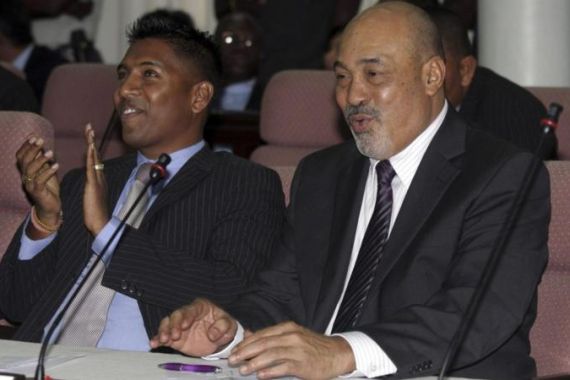Trial of Suriname president put on hold
Muder trial of Desi Bouterse and 24 others adjourned until constitutional court can review recently adopted amnesty law.

The murder trial of Desi Bouterse, Suriname president, has been put on hold until a constitutional court can review an amnesty law adopted by legislators in April.
Judge Cynthia Valstein-Montnor said on Friday that the case against Bouterse and 24 associates could not proceed until a constitutional court determined whether amnesty could be granted after a trial had already begun.
Bouterse and his co-defendants face charges that include murder, and the abduction and execution of 15 prominent political opponents under Bouterse’s military dictatorship way back in December 1982.
Last month, a majority of the 51-member National Assembly in the former Dutch colony voted to grant immunity from prosecution to Bouterse and the others charged over the executions.
That amnesty applies to crimes committed between 1980 and 1992. It also provides amnesty for the former military personnel who led the 1980 coup that propelled Bouterse to power.
Bouterse had been accused of having been present on December 8, 1982, at the military barracks of Fort Zeelandia, the colonial fortress in the capital where the alleged killings of 13 civilians and two military officials occurred.
He faced the possibility of up to 20 years in prison if he had been convicted in the trial, launched five years ago in the South American country.
Suriname has no sitting constitutional court and its members must now be appointed by Bouterse’s government before a review of the amnesty law can commence.
Proceedings in doubt
Bouterse was elected president by parliament in 2010 despite having led a military government from 1980-1987, during Suriname’s civil war.
Prosecutors were meant to make their closing arguments in the slow-moving trial on Friday, but the amnesty left the proceedings in doubt.
Last month Bouterse’s lawyer, Irvin Kanhai, asked the three-member court martial, led by Judge Valstein-Montnor, to dismiss the charges, pursuant to the amnesty law. Some of the other suspects had also asked for the case to be dropped.
Judge Ray Elgin had however asked that the trial be adjourned – not ended – until a constitutional court could test the amnesty law, calling it an “obstacle for the prosecution”.
“The amnesty law is an encroachment on the right of survivors to seek justice. The absence of the constitutional court makes review of the amnesty law impossible and that creates a constitutional vacuum,” Elgin said.
Bouterse previously hailed the amnesty as a “new beginning” for Suriname, but thousands of people took to the streets of the capital, Paramaribo, last month in protest, demanding justice for the victims and saying no one could be above the law.
The International Commission of Jurists sent an expert to Suriname to observe Friday’s hearing, to assess whether it was in accordance with both international law and Suriname’s constitution.
Several relatives of the victims who attended the hearing at a military base south of the capital said they were relieved the case was not dismissed outright.